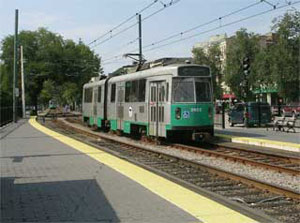GLX lawsuit redux as delay announcement looms
By Andrew Firestone
Mayor Joseph Curtatone threw down the gauntlet last Tuesday, September 13, when he called upon the Massachusetts Department of Environmental Protection (DEP) to hold the Green Line Extension plan to deadline, and not accept a delay of the opening in 2020.
“Further delays are just unacceptable and we are absolutely intent to pursue every available legal option and listen to me carefully: we will exhaust every legal option beyond until this obligation is met,” he said, hammering his fingers against the podium.
The Mayor made his comments at a hearing downtown at DEP headquarters. Members of the DEP, along with representatives from the Green Line Extension (GLX) project were in attendance, along with over two-dozen members of the community. The meeting came a few days before Governor Deval Patrick discussed the possible solution of phasing development in order to kick-start the flagging project.
The Commonwealth has yet to officially submit their delay, as they need to display a plan for pollution mitigation to the DEP in order to obey federal guidelines.
“Let’s remove the fact that transit development is a powerful and a cost-effective stimulus that will unlock over 300 acres of underutilized land that would become over 18 million sq. ft. of commercial, residential development creating more than 25,000 construction jobs followed by 30,000 permanent jobs,” said Curtatone.
“Let’s remove the fact that the Green Line project will lighten traffic by over 25,000 vehicle miles averting on our neighborhoods and local roadways today and decrease damage caused by thousands of communities cutting through our borders each day as the state has helped Somerville evolve into an on-and-off ramp from and to Boston. Let’s remove the fact that bringing the rail transit through the most densely populated city in New England is an essential element of providing our citizens with the livability, sustainability, and quality of life they deserve.”
“At the core is their legal obligation,” he said, reminding the DEP that MassDOT must build the GLX under the legally binding decision won by the Conservation Law Foundation. “The delay in the project, which is pending, which is imminent, perpetuates the negative health effects on our residents and the region.”
The DEP must give its blessing to any plan proposed by the MassDOT in their mitigation of environmental damages due to increased traffic in over populated areas. Without approval by the DEP, MassDOT cannot meet the “control measure obligation,” or their ability to show progress on the project. This places the Commonwealth in danger of losing even more federal funds.
The state legislature has already approved $600 million in bonds for the GLX project, of which only a fraction has been used. “We have the money that we need to do the work that we are doing today. I think that is a very important point to make,” said Project Manager Kate Fichter of the MassDOT.
However, the project cost has ballooned to over $1.2 billion in the last delay, necessitating hundreds of millions of dollars more. “Obviously it’s no secret that the construction of the Green Line Extension will be very expensive, which is part of why we are continuing to pursue federal funding to try to build the project,” she said.
Barring that, Fichter said that she would defer to the legislature for more bonds, an option that new Secretary of Transportation Richard Davey has said he will not do.
“The MassDOT board has voted to give us the funds that we need to complete the planning process, the environmental review process and the design process, which is everything we need to do right now,” said Fichter. “There’s no money issue at the moment.” She did note that these were not necessarily tangible or visible things, but that they were productive, and showed those in the DEP and federal government that the state was still behind the project.
“I think this may be an error, an oversight. I understand that there are very real fiscal problems with MassDOT, with the DEP, with the state, with the nation, with the world,” said Rep. Denise Provost (Somerville-D) at the DEP hearing.
“But this is a project which must not be allowed to lose any more time. I think that the DEP needs to require some acceleration of this program, require more transparency, particularly a very clear schedule, with start-dates and end-dates and intermediate dates, and where the funding is coming from, and not coming from along that path,” she said. She expressed worry that the state might fail on its commitment.
“The work that we’re doing now is critical to that next step as far as securing money for the actual construction,” said MBTA spokesman Joe Pesaturo. “This is how we demonstrate to those decision-makers that this project is real, here’s the design everyone’s on board and we’re ready to go.”
Curtatone did not share Pesaturo’s outlook. “This is not just a Somerville project, this project has great benefits to the region. We’ve waited patiently for the promise of six new stops under the Green Line Extension. To continue to extend the project deadline is not an option. We cannot deal with soft deadlines anymore. Broken promises will just not be accepted,” he said.
Curtatone said that the heart disease and respiratory illness felt by many surrounding I-93 was reason enough to give the residents of Somerville their GLX, including himself in the latter category.
“Think about the environmental injustice that you’ve helped create, that the state has helped create, as you knew what was going on when you poisoned our air. Think about those three commuter rails that come through our city, and not one of them stops,” he said.
“Earlier this year, the water quality of the Mystic was downgraded, downgraded to a ‘D minus,’ as a result of where the state has led,” he said.
“We cannot pay lip service to a cleaner environment here and expect it to happen.”
“Until we implement a cleaner mode of transportation to this section of our urban core, we are fighting an uphill battle in trying to improve our quality of life, our air, and our water quality.”
“We will be at every public meeting and we will drive this conversation. You will build this project, because we are not going to stop fighting until the trains start running and our residents get to breathe cleaner air and a more livable community,” he said.
















Reader Comments